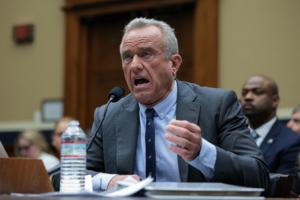Politics
/ArcaMax

Commentary: The Heritage Foundation founder's legacy is complicated
Edwin Feulner, the founder and longtime president of the Heritage Foundation, died last month. He will be remembered as one of the most consequential visionary leaders in modern conservatism. He will also be remembered as the person, more than anyone else, responsible for the Republican Party’s turn away from truth, expertise and good ...Read more

Leonard Greene: Hochul helps in redistricting fight against Texas-sized power grab
Texas officials didn’t have a problem sending thousands of migrants to New York, a sanctuary state, when the desperate asylum seekers illegally crossed the southern border.
They sent them here by the busloads.
But now, when a few of its lawmakers come to New York seeking sanctuary from an onerous redistricting vote, Texas leaders want to sic...Read more

Commentary: AI companions are harming your children
Right now, something in your home may be talking to your child about sex, self-harm, and suicide. That something isn’t a person—it’s an AI companion chatbot.
These AI chatbots can be indistinguishable from online human relationships. They retain past conversations, initiate personalized messages, share photos, and even make voice calls. ...Read more

Commentary: Democrats need a creative approach to the midterm elections
Let’s face it. The Democratic Party is in disarray. It will not win the 2026 congressional midterm elections if it limits its message to condemning President Donald Trump. And it will not win the 2026 elections if the party is seen as a cesspool of bickering and disagreement.
Americans are fed up with the inability of Congress to act, and ...Read more

Editorial: The 401(k) needs better guardrails
Tax-advantaged employer-sponsored retirement savings accounts hit a milestone not long ago: At least half of all private sector U.S. workers now participate in a 401(k).
That is good news in this respect: The alternative of not saving money for retirement could prove crushing. Finance experts have long cautioned against relying solely on ...Read more

Editorial: Count 'em all -- Trump has no authority to muck with 2030 Census Bureau count
Not caring about the U.S. Constitution is a regular refrain for President Donald Trump, who now wants to exclude undocumented people from the 2030 census count — a nonstarter as much else is in this bizarro world we now inhabit, promulgated via a screed on his Truth Social platform — is both a terrible idea and certainly a rehash.
Trump ...Read more

Commentary: Of course Trump wants to flex on DC. Where are the Democrats to stop him?
Remember “I alone can fix it”? President Donald Trump, who made that laughable statement in his 2016 convention acceptance speech, is now testing the theory in Washington.
Trump and his party have been threatening a D.C. takeover for years and made it part of the Republican platform last year. But it was all just empty talk and random ...Read more

Gene Collier: MAHA should be MAVA -- Make America Vulnerable Again
You're doubtless familiar with the term armchair quarterback, and probably with its myriad modifications for disciplines outside of football, like armchair meteorologist to connote enthusiasm for forecasting despite an obvious lack of expertise, but I heard a different usage yesterday that sounded truly groundbreaking.
Armchair epidemiologist. ...Read more

Trudy Rubin: Putin has the upper hand in meeting with Trump on Ukraine
Once again, a willfully blind President Donald Trump is walking into a trap set by Russian leader Vladimir Putin — by agreeing to meet him for a summit in Alaska on Aug. 15.
No matter how many times Putin insults the president and ignores his calls for a total ceasefire in Ukraine, Trump returns for more humiliation. He refuses to recognize ...Read more

Commentary: Democrats can't fight for democracy in Texas while undermining it in Illinois
Gov. JB Pritzker is once again talking about gerrymandering — just not in Illinois.
This week, he welcomed Texas Democratic legislators to Oakwood, Illinois, to denounce Republican redistricting efforts in that state. But while Pritzker lectures red states about fairness, he continues to ignore the glaring problems in his own backyard.
Don�...Read more

Editorial: One-man rule -- Trump's DC police takeover another authoritarian step
President Donald Trump using an obscure emergency provision in federal law pertaining to Washington, D.C. to attempt to take full control over the capital’s local police force is not responding to any “emergency,” but just a pure power grab.
Coming a day after he’d sent federal agents to patrol the streets and moved to deploy the ...Read more

Editorial: Gerrymandering now truly is a dangerous threat to American democracy
“If the United States is to deter a nuclear attack,” then-U.S. Secretary of Defense Robert McNamara said in a 1967 speech in San Francisco, “it must possess an actual and a credible assured-destruction capability.”
McNamara was elucidating a long-established defense concept known as “mutually assured destruction,” meaning that if ...Read more

Mary McNamara: Disney's settlement with 'Mandalorian' actor Gina Carano isn't capitulation. Firing her was
Actress Gina Carano, Lucasfilm and its parent company Walt Disney Co. have settled the federal lawsuit filed in which Carano claimed that, in 2021, she was wrongfully terminated from her role in “The Mandalorian” after she expressed her conservative political views on social media.
The settlement details have not been made public, but ...Read more

John M. Crisp: Entitlement to power is always terrible for democracy
When Texas legislators lit out for New York and Illinois in order to deny Republicans the quorum that they need to enact a mid-decade redistricting map, I wasn’t thrilled. The cause is righteous, but when has quorum-busting actually worked?
Democrats fled Austin in 1979, 2003 and 2021 in efforts to prevent Republicans from railroading bad ...Read more

Marc Champion: Putin is about to outplay Trump again in Alaska
Ukrainian and European leaders are worried President Donald Trump will get played for a second time when he meets his Russian counterpart in Alaska on Friday — and they’re right to be nervous.
Indeed, if Trump wants to emerge from the talks a master negotiator rather than a pushover, his smartest move may be to postpone the summit until it...Read more

Andreas Kluth: The US will regret throwing India under the bus
President Donald Trump just threw India under the bus. After months of affronts and barbs, Washington now treats New Delhi more as foe than friend, undermining a relationship that several American administrations — including Trump’s first — tried to strengthen, not least to contain China in the Indo-Pacific. Instead, India will now ...Read more

Commentary: Immigration spying has inglorious past
In the early 1900s, the U.S. Bureau of Immigration created a special “Chinese Division” to enforce the Chinese Exclusion Act of 1882, which was the first major U.S. immigration law to ban entry based on race and nationality. Federal agents were sent to Mexican border towns and tasked with secretly photographing, tracking and cataloging ...Read more

Commentary: Innovating America's democracy is our tradition and our responsibility
The American story is one of constant innovation and renewal, where democracy rises to meet the challenges of each new age. Our history documents a journey of transformation, inviting us to reflect on centuries of innovation in American democracy.
Citizens have routinely amended outdated practices, reinforced core tenets, and forged new ...Read more

Commentary: Newsom's cynical redistricting ploy should be rejected by voters
Gov. Gavin Newsom’s political ambitions have reached a new low. In his efforts to look like a “fighter” ahead of a potential run for the presidency in 2028, he’s willing to ignore democratic rules in pursuit of political aims, setting aside the state’s independent redistricting system to counter Texas Republicans’ proposed partisan ...Read more

Editorial: Spare vaccines, focus on ultra-processed foods
One of the more notable successes of President Donald Trump’s first term was how the administration was able to develop effective COVID-19 vaccines so quickly.
That impressive speed — less than one year compared to the decade or more of research and development that other vaccines have required — likely saved millions of lives worldwide....Read more























































